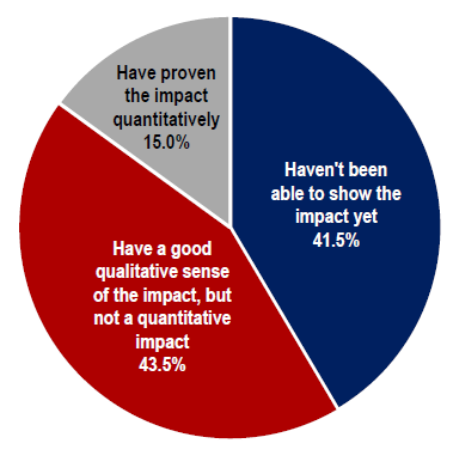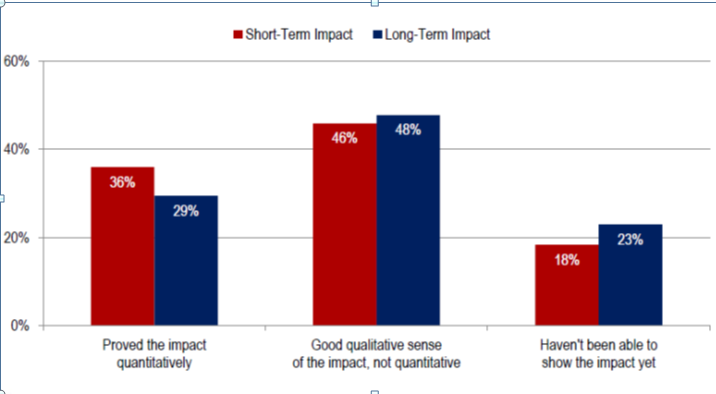
A survey reveals that few corporations can quantify the impact of their social media marketing. Source: The CMO Survey
Corporations still struggle to measure their social media marketing efforts but expect to invest more resources in marketing analytics.
Only 15% of marketing executives say they can prove the impact of social media on their business using quantitative approaches, according to the CMO Survey of 255 top marketing executives this month. Just 36% of the marketers said they can measure short-term impact of marketing analytics on their business, and just 31% of projects use the data.
Companies, however, are putting more resources into social media analytics. The portion of budgets spent on gathering and analyzing customer data is expected to climb by 66% in the next three years. More than 36% of firms are using marketing analytics to acquire customers, up five percentage points from six months ago.
That movement is part of the general trend of companies beginning to integrate social media into their overall marketing strategies.

Companies lack quantitative metrics to demonstrate the impact of marketing spending. Source: The CMO Survey
“The integration of social media and marketing strategies is finally showing a slight lift after years of stagnation,” said Christine Moorman, a professor at Duke University’s Fuqua School of Business and director of The CMO Survey. “But companies are still struggling to objectively assess the value they are getting from their social media investments.”
Social media spending currently accounts for 10.7% of marketing budgets, but is expected to make up almost a quarter of spending, 23.8%, in the next five years. The latest survey finds a small improvement in marketers’ satisfaction to integrate social media into their overall marketing strategies.
Other Researchers Concur
Other research has shown that measuring social media marketing remains a major challenge for brands.
Asked to name the three most challenging aspects or their social program, in a survey by TrustRadius, a business software review site, most marketers (60%) cited measuring ROI, half named tying social activities to business outcomes, and 48% listed developing their strategy. The survey revealed that marketers favor “soft” metrics that have little connection to business goals. Many marketers generally turn to vanity metrics, such as likes and followers to measure success. While easy to report, those metrics have little link to business goals.
One survey respondent reflected a widespread attitude by admitting the company lacks definable goals and has not monetized social media. The organization is active on social media simply “because it seems like a bad idea not to be.”
Mobile Marketing Robust Growth
According to the CMO study, marketers rate their mobile marketing as underperforming and spending on mobile advertising is expected to soar by 160% in the next three years and consume a 15.6% share of marketing budgets. Companies now spend 6% of marketing budgets on mobile marketing, which they expect to increase to 15.6% over the next three years.
The huge 160% increase reflects a growing reliance on mobile to interact with customers where they look for information and make purchases. Companies hope to reach customers closer to the time of purchase in order to make them aware of offerings, deals, and additional information that may help close more sales.
Other findings include:
- Spending on digital marketing overall is expected to increase by 12.2%, with marketers predicting the amount spent on traditional advertising will fall by 2.1% — a trend the survey has observed for the last several years.
- Hiring growth in the marketing sector is expected to increase 6.6% in the next year, reversing a three-year slide.
- Marketing budgets are expected to grow by 5.5% in the next year, continuing positive fluctuations in their growth rates.
- Marketing spending represents 6.6% of company revenue, maintaining a downward trend, and about 11% of overall budgets.
Bottom Line: Companies expect to increase their spending on social media marketing and invest more resources into social media analytics in an attempt to overcome the measurement shortcomings. As social media continues to become more popular, companies that can best analyze social media data and gain insights will obtain a competitive advantage.
William J. Comcowich founded and served as CEO of CyberAlert LLC, the predecessor of Glean.info. He is currently serving as Interim CEO and member of the Board of Directors. Glean.info provides customized media monitoring, media measurement and analytics solutions across all types of traditional and social media.




